20-01
Israel Sinned [20-01]
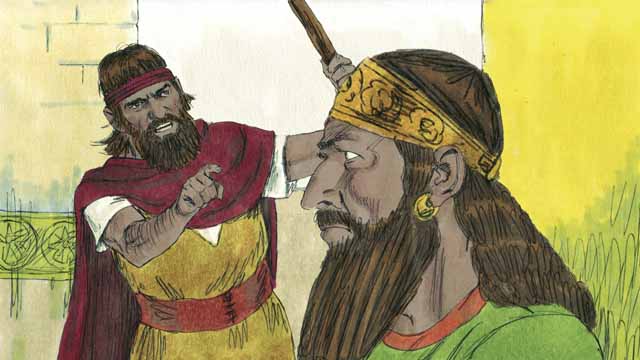
The kingdom of Israel and the kingdom of Judah both sinned against God. They broke the covenant that God had made with them at Sinai. God sent his prophets to warn them to repent and worship him again, but they refused to obey.
以色列族和犹大族都对神犯了罪。他们打破了曾经和神在西奈山所定下的契约。神派遣先知来警告他们,使他们重新敬拜神,可是他们不听神的警告。
Important Terms:
Translation Notes:
- broke the covenant - That is, "disobeyed the commands God had given them in his covenant with them at Mount Sinai."
- warn them to repent and worship him again – Another way to translate this would be, "tell them to stop sinning and to worship Yahweh instead of other gods, or terrible things would happen to them."
20-02
Assyria Destroyed Israel [20-02]
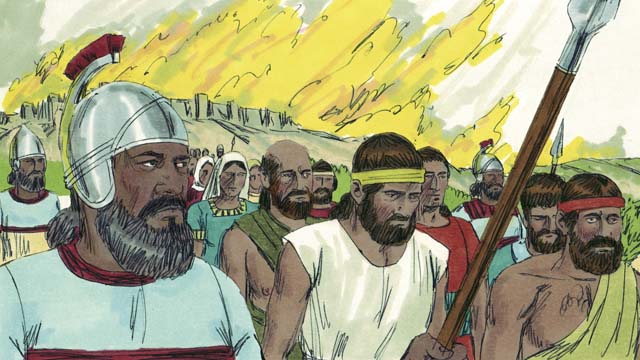
So God punished both kingdoms by allowing their enemies to destroy them. The Assyrian Empire, a powerful, cruel nation, destroyed the kingdom of Israel. The Assyrians killed many people in the kingdom of Israel, took away everything of value, and burned much of the country.
所以神惩罚了以色列人和犹大人,让他们被其它民族摧毁。以色列被一个强大而残酷的亚述族打败。亚述人杀死很多以色列人,掳走他们所有财物,并且几乎烧毁他们的国家。
Important Terms:
Translation Notes:
- both kingdoms - This refers to both the kingdoms of Israel and Judah.
- Empire - A country was called an "empire" when it was powerful enough to extend its authority over many other countries.
- took away - That is, "stole." They stole these valuable things and carried them back to Assyria.
20-03
Israel Was Removed from the Land [20-03]
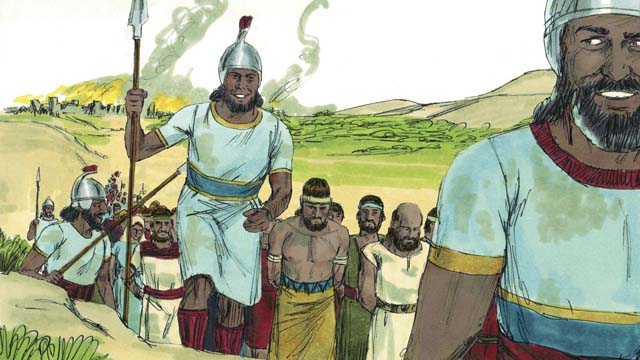
The Assyrians gathered all the leaders, the rich people, and the people with skills and took them to Assyria. Only the very poor Israelites who had not been killed remained in the kingdom of Israel.
亚述人将他们中的领袖、富人、还有一些有技能的人聚集在一起,统统带到亚述国去。剩下的只有那些幸存的穷人留在以色列。
Important Terms:
Translation Notes:
- skills – This refers to practical skills such as woodworking, metalworking, and building.
- remained - That is, "stayed" or, "were left behind" or, "were allowed to stay behind."
20-04
Foreigners Were Brought to Israel [20-04]
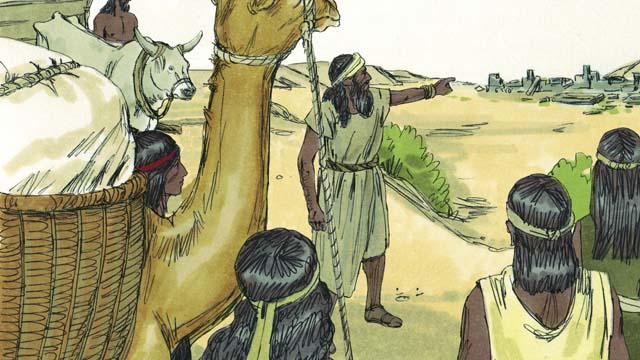
Then the Assyrians brought foreigners to live in the land where the kingdom of Israel had been. The foreigners rebuilt the destroyed cities and married the Israelites who were left there. The descendants of the Israelites who married foreigners were called Samaritans.
后来亚述人带别国居民定居于以色列。这些外国人重建了以色列,还和剩余的以色列人通婚。他们的后裔被称为撒玛利亚人。
Important Terms:
Translation Notes:
- foreigners - This refers to people who were not Israelites.
20-05
Judah also Worshiped Idols [20-05]
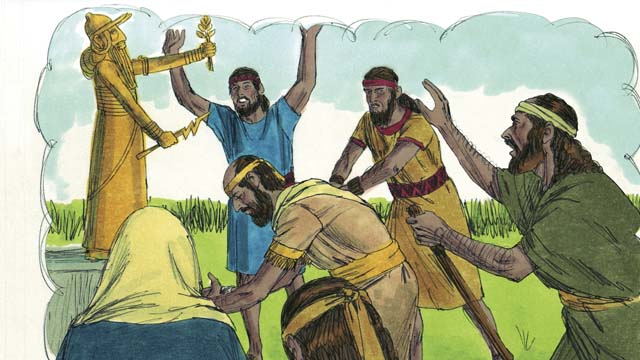
The people in the kingdom of Judah saw how God had punished the people of the kingdom of Israel for not believing and obeying him. But they still worshiped idols, including the gods of the Canaanites. God sent prophets to warn them, but they refused to listen.
犹大人亲眼看见神因为以色列族背叛上帝而惩罚他们。但是他们仍然拜偶像,仍然相信迦南人的神。即使上帝派遣先知警告他们,他们也不听。
Important Terms:
Translation Notes:
- for not believing and obeying him – Another way to translate this would be, "because they did not believe or obey him."
- warn them – That is, "tell them to stop sinning or terrible things would happen to them."
- they refused to listen - That is, "they refused to obey" or "they refused to stop their evil behavior."
20-06
Judah Served Babylon [20-06]
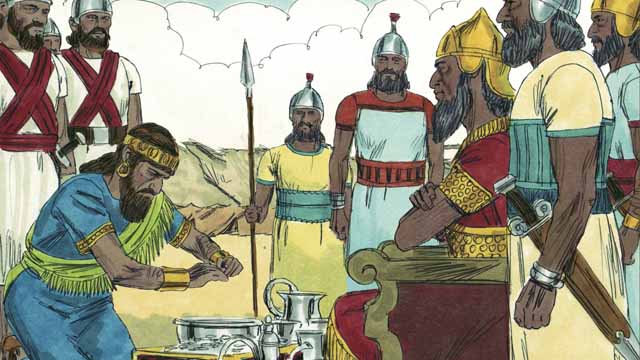
About 100 years after the Assyrians destroyed the kingdom of Israel, God sent Nebuchadnezzar, king of the Babylonians, to attack the kingdom of Judah. Babylon was a powerful empire. The king of Judah agreed to be Nebuchadnezzar’s servant and pay him a lot of money every year.
大约在亚述国摧毁以色列国后一百年,上帝派巴比伦国王尼布甲尼撒去攻打犹大国。巴比伦是一个强大的帝国。犹大国王同意作尼布甲尼撒的仆人,并且每年缴纳巨额钱财给他。
Important Terms:
Translation Notes:
- empire - See how you translated this in [[:zh:obs:notes:frames:20-02|[20-02]]].
- agreed to be – The king of Judah was forced to either serve the Babylonian king or be destroyed.
- to be Nebuchadnezzar's servant - This could be translated as, "to govern Judah under Nebuchadnezzar's command."
20-07
Babylon Destroyed Judah [20-07]
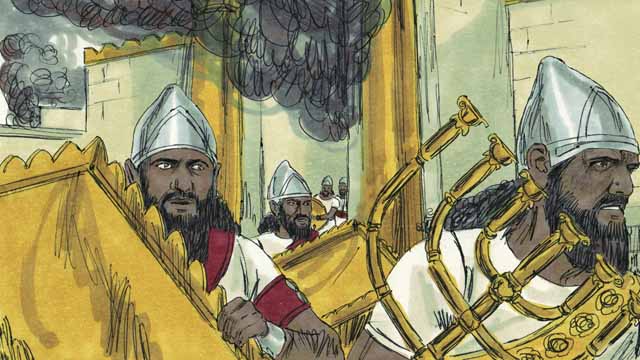
But after a few years, the king of Judah rebelled against Babylon. So, the Babylonians came back and attacked the kingdom of Judah. They captured the city of Jerusalem, destroyed the Temple, and took away all the treasures of the city and the Temple.
但是很快的犹大人民反叛巴比伦国。所以巴比伦人又攻击他们。他们占领耶路撒冷圣城,摧毁他们的神殿,掳走他们所有的财物。
Important Terms:
Translation Notes:
- came back - This may also be translated as, "returned" or "came to Judah again."
- captured the city - That is, "took control of the city and the people there."
- took away - They carried the treasures with them back to Babylon.
20-08
The Kind of Judah Was Punished [20-08]
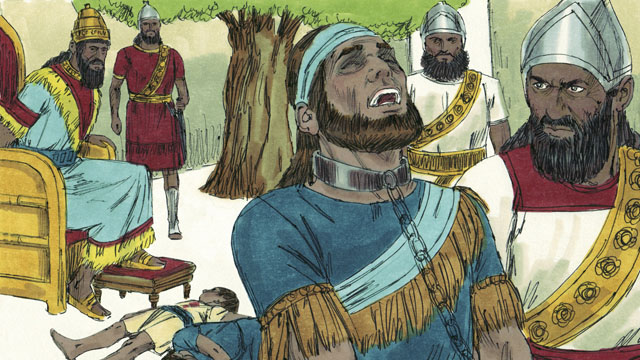
To punish the king of Judah for rebelling, Nebuchadnezzar's soldiers killed the king’s sons in front of him and then made him blind. After that, they took the king away to die in prison in Babylon.
为了惩罚犹大国王的背叛,尼布甲尼撒的士兵当着他的面杀害了他的亲生儿子还弄瞎了他的双眼。之后他们将犹大国王囚禁于巴比伦监狱中,直到死去。
Important Terms:
Translation Notes:
- To punish - Nebuchadnezzar punished the king of Judah by telling his soldiers to do these things.
- in front of him - This may be translated as, "where he could see," or "so that he could see it," or "before his eyes."
- made him blind - This may also be translated as, "destroyed his eyes."
20-09
Judah Was Taken to Babylon [20-09]
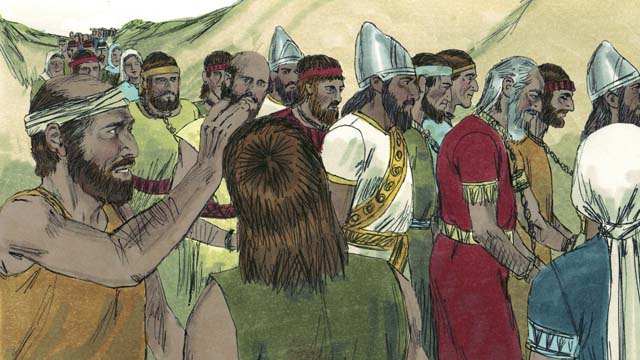
Nebuchadnezzar and his army took almost all of the people of the kingdom of Judah to Babylon, leaving only the poorest people behind to plant the fields. This period of time when God's people were forced to leave the Promised Land is called the Exile.
尼布甲尼撒和他的军队将犹大国的所有人带到巴比伦,只留下最穷困的一些人种植庄稼。这就是所谓的放逐。
Important Terms:
Translation Notes:
- leaving…behind - That is, "leaving only the poorest people in Judah" or, "letting only the poorest people stay in Judah."
- This period of time - To translate this, choose a phrase that can refer to a long time, since this exile period lasted seventy years.
- Exile - The word "exile" means someone is removed from they country by force. The "Exile" is the term for this 70-year period when the Israelites were forced to live in Babylon.
20-10
God Remembered His Promise [20-10]
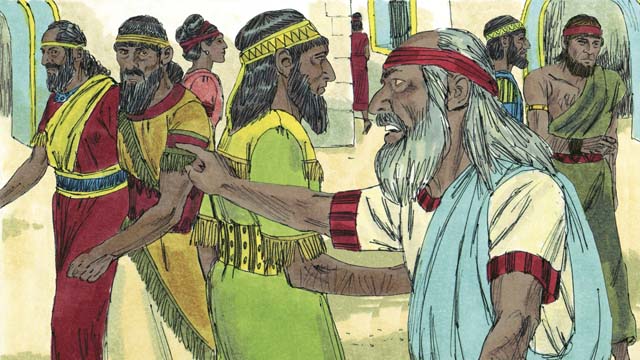
Even though God punished his people for their sin by taking them away into exile, he did not forget them or his promises. God continued to watch over his people and speak to them through his prophets. He promised that, after seventy years, they would return to the Promised Land again.
尽管他们因着罪被放逐,神并没有忘记他的民和他的应许。神眷顾他的子民并且派先知和他们说话。神答应70年后,会让他们重新回到应许之地。
Important Terms:
Translation Notes:
- exile - See how you translated this term in [[:zh:obs:notes:frames:20-09|[20-09]]].
- did not forget - This could be translated as, "did not ignore" or, "did not neglect." Or the whole phrase could be translated as, "continued to honor his commitment to his people and his promises."
- watch over - That is, "take care of."
- speak to them through his prophets - This could be translated as, "tell his prophets messages that he wanted them to tell his people."
20-11
Persia Defeated Babylon [20-11]
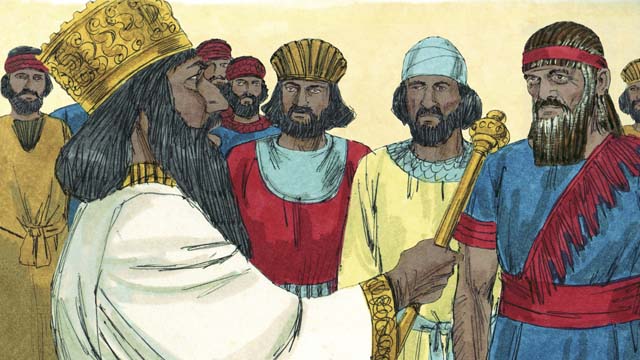
About seventy years later, Cyrus, the king of the Persians, defeated Babylon, so the Persian Empire replaced the Babylonian Empire. The Israelites were now called Jews and most of them had lived their whole lives in Babylon. Only a few very old Jews even remembered the land of Judah.
大约70年后,波斯国王居鲁士打败了巴比伦帝国。波斯是一个强大而仁慈的帝国。这时候的以色列人被称为犹太人,他们中的大多数都在巴比伦度过一生。只有为数不多的老年人还记得犹大国的故土。
Important Terms:
Translation Notes:
- seventy years later - This refers to the seventy years that had passed since the Babylonian army took the people of Jerusalem into exile.
- Cyrus - Cyrus was also called, "Cyrus the Great." The name "Cyrus" meant "like the sun" in the Persian language. However, since Cyrus was an important historical person, it might be best to transliterate his name, rather than translating the meaning.
- Persians - The Persian Empire grew to cover the area from central Asia to Egypt. Its home was located in the general area of modern-day Iran.
- The Israelites were now called Jews - This could also be translated as, "People now called the Israelites by the name 'Jews.'"
- the land of Judah - That is, the area where the kingdom of Judah was located before the Exile. Jerusalem was the capital city of Judah.
20-12
Cyrus Sent Judah Home [20-12]
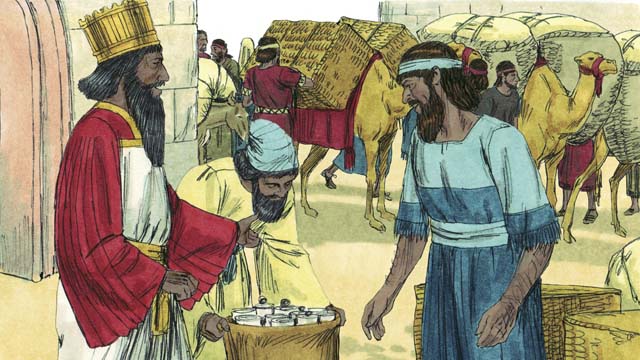
The Persian Empire was strong but merciful to the people it conquered. Shortly after Cyrus became king of the Persians, he gave an order that any Jew who wanted to return to Judah could leave Persia and go back to Judah. He even gave them money to rebuild the Temple! So, after seventy years in exile, a small group of Jews returned to the city of Jerusalem in Judah.
居鲁士执政不久,他就做了一件在历史上绝无仅有的壮举。他颁布一条法令:犹太人可以自由重返自己的犹大国故土。他甚至出资让犹太人重建神殿。被放逐了70年后,一小群的犹太人返回到耶路撒冷城。
Important Terms:
Translation Notes:
- Persian Empire - See how you translated this term in [[:zh:obs:notes:frames:20-11|[20-11]]].
- Cyrus - See how you translated his name in [[:zh:obs:notes:frames:20-11|[20-11]]].
- Judah - See the note about Judah in [[:zh:obs:notes:frames:20-11|[20-11]]].
- to return to Judah - Since most of these Jews were the children and grandchildren of those who left Judah, they had never lived in Judah before. In some languages it might be better to say "to go to Judah."
- exile - See how you translated this term in [[:zh:obs:notes:frames:20-09|[20-09]]].
- returned – That is, "went back." Some languages may prefer to say, "went" since most of these people had never been to Jerusalem.
20-13
The Temple Was Rebuilt [20-13]
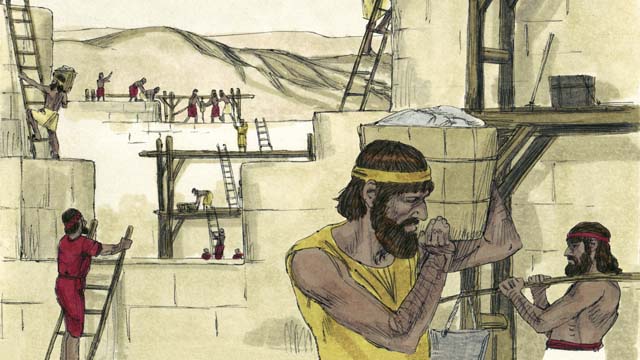
When the people arrived in Jerusalem, they rebuilt the Temple and the wall around the city. Although they were still ruled by other people, once again they lived in the Promised Land and worshiped at the Temple.
到了以后,他们重建神殿,重修耶路撒冷城墙。尽管他们仍然受别人控制,但是他们重回应许之地,并且在神殿敬拜自己的上帝。
Important Terms:
Translation Notes:
- the people - That is, the Israelites, the descendants of Jacob, who were now called the Jews.
- the wall - This wall was very thick (2.5 meters) and was built to protect the city from attackers.
- ruled by other people - That is, another nation controlled them. The Jews were ruled by the Persians at this time, and later by other nations.
- once again - In some languages this might need to be translated as, "now" or, "as their ancestors had done" or, "just as before the Exile."
- worshiped at the Temple - They worshiped Yahweh, the One True God, at the Temple they rebuilt.
- A Bible story from - These references may be slightly different in some Bible translations.
